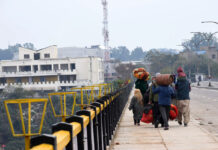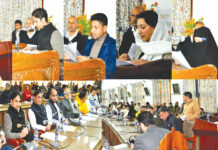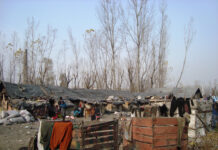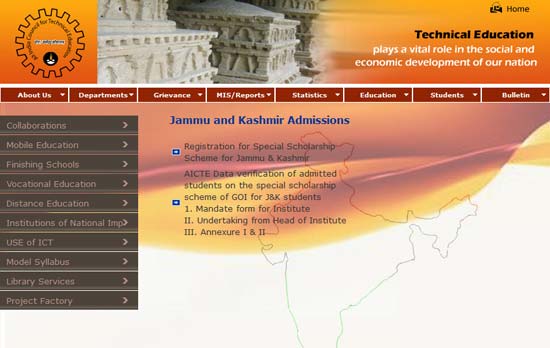Pakistan threw a spanner in Saudi Airline plans to operate from Srinagar International airport, citing disputed nature of territory, spiking its plans to pick up 6,676 Hajjj pilgrims directly to Jeddah. Breaking the tradition, Indian government this year had allowed limited bidding to end monopoly of Air India in Hajj operations, thereby saving Rs. 40 crore.
There was no problem all these years as it was always the state-owned Air India flying the Hajj pilgrims direct from Srinagar. It, however, lost the bid this year to the Saudi Airlines, the national carrier of Saudi Arabia, which bagged the contract for all Hajj flights from across India by quoting Rs 40 crore less.
 The Saudi Airline has booked the Kashmiri pilgrims but it put up the hands to pick them up from Srinagar as Pakistan denied it over flight permission to land in the Jammu and Kashmir capital. It just served a notice on the Central Hajj Committee that it will pick up these pilgrims from Delhi only and it is the Hajjj Committee’s problem, how they travel to Delhi.
The Saudi Airline has booked the Kashmiri pilgrims but it put up the hands to pick them up from Srinagar as Pakistan denied it over flight permission to land in the Jammu and Kashmir capital. It just served a notice on the Central Hajj Committee that it will pick up these pilgrims from Delhi only and it is the Hajjj Committee’s problem, how they travel to Delhi.
Islamabad can ill-afford to annoy Saudi Arabia that is among its top friendly countries. It reportedly conveyed that it has no problem in allowing its air space for the Saudi airlines but it cannot be allowed for landing in Srinagar because of the disputed nature of the region.
Pakistan High Commission spokesman Shah Zaman Khan declined to comment saying he has “no comments to offer on this particular issue” but went on to indirectly justify his government’s act on the ground that Jammu and Kashmir is an “internationally recognised dispute” and Pakistan would not permit any attempt to change this status.
“The issue has been recognised by the United Nations as well as it is the core issue of discussion at the bilateral meetings between India and Pakistan. Pakistan would not allow any attempt to change this status. We seek a peaceful settlement of Kashmir issue in accordance to aspirations of Kashmiri people through purposeful negotiations,” the spokesman added.
The Kashmiri pilgrims were in a quandary while the Central government turned a deaf ear to repeated appeals by J&K Chief Minister Omar Abdullah to sort out the problem. He wanted the Centre to persuade the Pakistan Government to give air passage to the Saudi flights, but it is not known if the External Affairs Ministry made any effort in this direction.
The pilgrims were banking on the Chief Minister to sort out the problem, knowing well the kind of access he has in Delhi and only lately some of them started moving to Delhi on their own to ensure they do not miss their Hajj flights, after the Hajj Committee announced names of the passengers booked by the Saudi Airlines’ flights from Delhi.
Those stranded in Jammu and Kashmir, however, heaved a sigh of relief as it was announced late on Friday, October 8, less than 24 hours before the first Kashmiri batch of 200 pilgrims was to board the flight, that two flights of Go Air and Spice Jet have been chartered to carry the pilgrims to Delhi to catch the flight to Jeddah from there.
The private airlines were preferred over Air India because of the cost factor as the pilgrims who have already paid Rs 16,000 as the airfare cannot be asked to shell out more. It is not known whether the state government is bearing the cost or the Saudi Airlines will be made to pay as per the international practice and also as per the contract that required it to lift the passengers from Srinagar.
Since the Saudi Airlines refused the government’s suggestion to make Delhi as a hopping station to fly to Srinagar to pick up the pilgrims as uneconomical, the government may force it to bear the cost of the transportation of the pilgrims from Srinagar by the two private Indian airlines.
Not prepared to accept Paksitan’s upper hand in allowing or not allowing international flights to and from Srinagar, the Indian officials tried to give an alibi that Srinagar being a defence airport cannot be opened up to the foreign airlines. When confronted that it has been already declared an international airport, they said the Saudi Airlines may also not like to land there as the foreign airlines often perceive the defence airports as “disturbed.”
They, however, had no answer when asked about the government adding Goa this year among the places from where the direct Hajj flights are taking off and that too despite the fact that it too has a defence airport. They wriggled out, pointing out that Goa is a peace destination where the foreign flights land routinely while it is not so with Srinagar where no foreign aircraft are allowed in view of the security scenario.
The problem could not have occurred but for the government deciding to call for tenders this year for the Hajj flights to reduce the huge subsidy of Rs 894.77 crore in 2008 and Rs 689.91 crore in 2009 it had to pay, as also to take care of the Air India not having enough aircraft to handle over one lakh people going for the Hajj this year.
As Salman Khursheed, Union Minister of State for Minority Affairs (independent charge), admits “The Hajj Act provides for Air India, the national carrier, as the sole carrier for the Hajj pilgrims, but the UPA government on experimental basis allowed a limited bidding this year and the Saudi Airlines won the bidding.” He says the government may save Rs 40 crores on subsidy because of the bidding for the chartered flights to Saudi Arabia.
“Three airlines, including Air India, had participated in the bidding. Such bidding will be increased gradually in coming years. Saudi Airlines and its subsidiary were chosen due to their track record. Saudis have been airlifting pilgrims over the past few year as Air India was sub-letting operations to them for the paucity of fleet,” Khursheed said.
 He went on to point out that the bidding has saved the government not less than Rs 40 crores. “The to and fro fare to Jeddah is quite high, but all that the government is charging per pilgrim is Rs 16,000 for the 2010 Hajj travel. We will have full figures once Hajj operations are complete.”
He went on to point out that the bidding has saved the government not less than Rs 40 crores. “The to and fro fare to Jeddah is quite high, but all that the government is charging per pilgrim is Rs 16,000 for the 2010 Hajj travel. We will have full figures once Hajj operations are complete.”
A total of 1.17 lakh persons registered with the government this year for the subsidized Hajj, while another 50,000 are to travel on their own, paying as high as Rs 40,000 to Rs 50,000. The pilgrim who goes through the government arrangement pays altogether Rs 1 lakh, including Rs 16,000 for the flight. A controversy is also ranging among the Muslims on whether it is religiously permissible to go on Hajj with the government subsidy as the pilgrimage is not supposed to be performed with others’ money.
This is not the first time that the Pakistan threw spanners in the air services in Kashmir. Its objections were fundamental to the halt of the Srinagar Dubai flights. Congress president Sonia Gandhi inaugurated the maiden international operations of the Srinagar airport on February 14, 2009.
But it lost the steam in less than a year. Initially for Air India it did not make a viable option. Against the carrying capacity of 9100 passengers to Dubai from Srinagar in its first year it had bagged only 3300. The incoming passengers were even lesser –2300. Against the daily capacity of 160, they were getting only 54. For the flying costs of Rs 250 thousand per hour, the carrier was unable to retrieve even half of it.
Pakistan denied the flight its air space forcing the carrier to take a longer route adding to the losses. The AI flew only 48 flights and the load never crossed 35 percent. Retention of the visa facilities at Delhi was still a major handicap as people going for visa requirements were planning their flights from Delhi only.
Later authorities choose to go through Amritsar in Punjab where they were getting some passengers. The other motive for flying through Punjab was aimed at flying over Pakistan that would shorten the distance and the costs. Flight’s take off from Punjab would end the Pakistan argument that the flight was emanating from Kashmir which is a disputed territory between the two countries. But the carrier could not get much response there as well and finally it was withdrawn.













